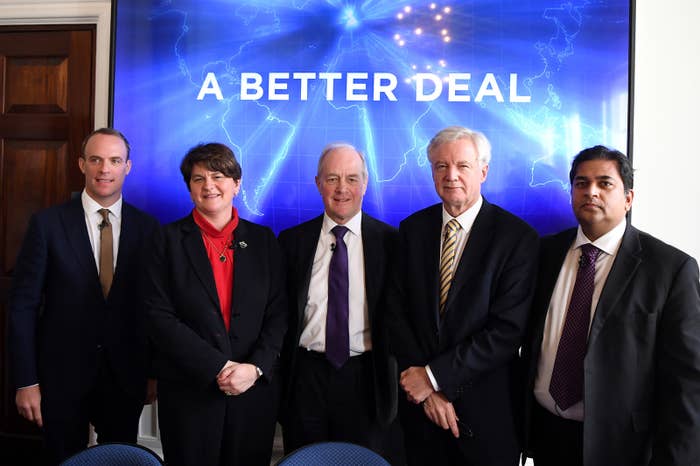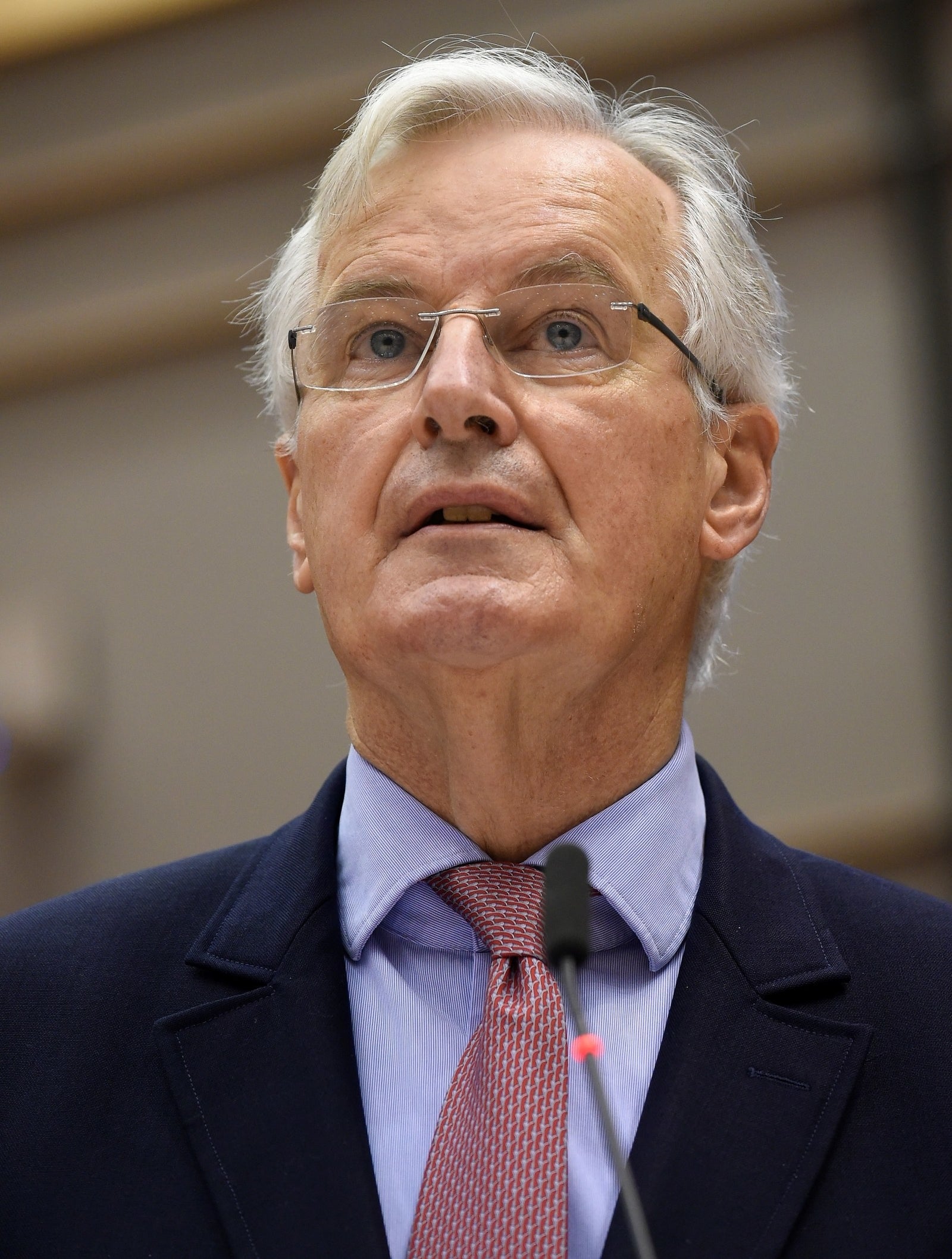
Theresa May is looking at putting an Irish backstop "sunset clause" to a vote in parliament next week, BuzzFeed News has learned, and then using the result to demonstrate to Brussels the changes required that would see a Brexit deal secure a majority.
In a statement to the House of Commons on Monday afternoon, the prime minister said MPs remained concerned that the UK could be trapped in the backstop permanently, and that she would take the outcome of further talks with colleagues over the issue back to the EU.
The PM also announced that the government would waive the £65 charge for EU nationals who want to stay in the UK after Brexit — a headline-catching U-turn that was immediately welcomed by campaigners.
But the rest of her statement was thin on substantive concessions, beyond the offer of a bigger role for Parliament in shaping negotiations over the future relationship with the EU. May reiterated her opposition to revoking Article 50 or calling a second referendum, and she flatly ruled out reopening the Good Friday Agreement as a means of solving the Northern Irish border question.
Instead, the focus of May's plan B, as she told a cabinet conference call on Sunday night, is to win over Conservative and Democratic Unionist Party MPs with changes to the backstop, the insurance policy that keeps the Irish border open in all circumstances, rather than trying to win cross-party support by agreeing to a permanent customs union.
In his response to May in the Commons, Labour leader Jeremy Corbyn asked her why she thought an approach that didn't work in December would work in January.
And the EU’s chief Brexit negotiator, Michel Barnier, insisted on Monday that the withdrawal agreement, including the backstop, is not up for renegotiation.
One idea under consideration in Downing Street is a version of the amendment tabled by Tory backbencher Andrew Murrison last week, which would have added a legally binding codicil to the withdrawal agreement that included an end date to the backstop.
The amendment, which was privately backed by government ministers and whips, did not come to a vote after Speaker John Bercow declined to select it.
A Whitehall source told BuzzFeed News they believed a sunset clause would win the support of nine out of the ten DUP MPs — with the exception of hardliner Sammy Wilson — in turn providing Tory Brexiteer rebels with a ladder to climb down.
Eddie Hughes, who resigned as a ministerial aide last week to oppose the deal, told the BBC’s Westminster Hour that such a clause would “go a long way to allaying my fears — and I would think the DUP would be keen to be involved as well then”.
Another Conservative MP told BuzzFeed News the proposal was under “live” discussion on Monday morning and that it could attract the support of dozens of Labour backbenchers to win a “single-figure” majority.

They said the final end-date would be a matter for negotiation with the EU if the proposal could win support at the vote on the government’s “next steps” due on Jan. 29. Former Brexit secretaries Dominic Raab and David Davis, along with DUP leader Arlene Foster, have previously proposed a 10-year maximum limit to the backstop.
A Downing Street insider confirmed May’s “plan B” is to seek changes to the backstop that could “unite” Tory and DUP MPs. But they warned that many of the Brexiteer rebels’ demands, such as a unilateral break clause from the backstop, are undeliverable and that they would have to compromise.
They added that a no-deal Brexit is not an option as attempts by Dominic Grieve, Nick Boles, and Yvette Cooper to prevent it would succeed with the backing of the Speaker. The May ally said they feared Brexiteer rebels hoping for no-deal would not “realise” this until it was too late.
Number 10 is looking at persuading “key influencers” in the press and on social media who have previously been hostile to the deal to swing behind it and apply pressure to Brexiteer rebels.
The Conservative commentator Iain Dale wrote in the Mail on Sunday that hardliners in the Tories’ European Research Group “have done huge damage to the prospect of getting any meaningful Brexit at all”. The pro-Brexit Guido Fawkes website tweeted yesterday that “a bad Brexit is better than no Brexit. At least UK will be out of the EU”. And the former Vote Leave campaigner Darren Grimes said: “Mrs May’s deal is better than remaining.”
Downing Street also hopes to convince the Sun, the Telegraph, and the Spectator — which have all strongly criticised the deal — to change tack in the coming weeks.
An ERG MP messaged their WhatsApp group last night that they hoped May’s plan to secure changes to the backstop worked. “I fear for our party and our colleagues in marginal seats if it doesn’t. She is spurning the remainers to work with us.”
But another ERG MP warned that while the group would support a deal that brought meaningful changes to the backstop, it would not be spooked by Downing Street into voting for a deal at any price.
They expressed concerns that any changes to the backstop would be cosmetic and that May was trying to use the threat of no Brexit to bounce them into voting for essentially the same deal. They added that even if the DUP and most of the ERG relented, the remaining hardliners could still sink the deal by 30 votes.

In an interview with RTÉ on Monday, Barnier was asked three times if there was any scope for further concessions on the backstop. Each time, he said the withdrawal agreement, including the backstop, was the best deal possible.
The EU has long been clear that it would not accept any substantive changes to the withdrawal agreement, nor any proposal that contradicts the substance of the deal, including the addition of any legally binding end date to the backstop. The point was reaffirmed at last December’s European Council meeting of EU leaders — and there are few signs that it will change now.
Asked whether a codicil introducing a sunset clause to the backstop was feasible, an EU official replied: “No.”
Pushing an end date further into a distant future would be unlikely to shift the position, the same official explained, pointing to the fact that the size of May’s defeat in the Commons meant that her challenges went beyond the backstop.
A senior European government official sarcastically described the idea as “interesting”, before adding that it was “like running on the spot”.
However, on Monday the foreign minister of Poland raised some hope among UK officials, saying that the backstop should be limited to five years. Ireland's deputy prime minister Simon Coveney was quick to react, saying the idea didn't reflect EU thinking.
Poland's foreign minister breaks ranks with EU to suggest the Irish backstop should be limited to five years. Adds that Ireland has more to lose than UK, while a temporary backstop is better than Dublin having to put up a border if there's no deal. https://t.co/yZwzCcSqKK
The remaining member states, or EU27, have otherwise presented a united front, and this apparent dent in it raised eyebrows among capitals that dismissed the possibility of a shift. A senior European government official said: “They [Poland] are quite the odd ones.”
Over the weekend, the Sunday Times reported that May would try to solve the issue of the backstop through a bilateral deal with Ireland. The Irish government immediately shot the idea down.
As #Brexit dominates news coverage, no surprise that some analysis today gets it wrong. I can reassure you the Irish Govt’s commitment to the entire WA is absolute - including the backstop to ensure, no matter what, an open border between Ire + NI and the #GFA are protected.
Senior EU sources explained that the Irish border was not only a bilateral issue. When the UK leaves the EU, the Irish border becomes the EU’s external border, meaning that while an overall solution may well include bilateral elements, it would still need to be compatible with EU law and viable for the EU27, who have indicated multiple times that the backstop is also there to protect the integrity of the single market.
An informed source said of the viability of the bilateral agreement idea: “A Non-Runner? It’s not even a horse. Though may be a unicorn.”

